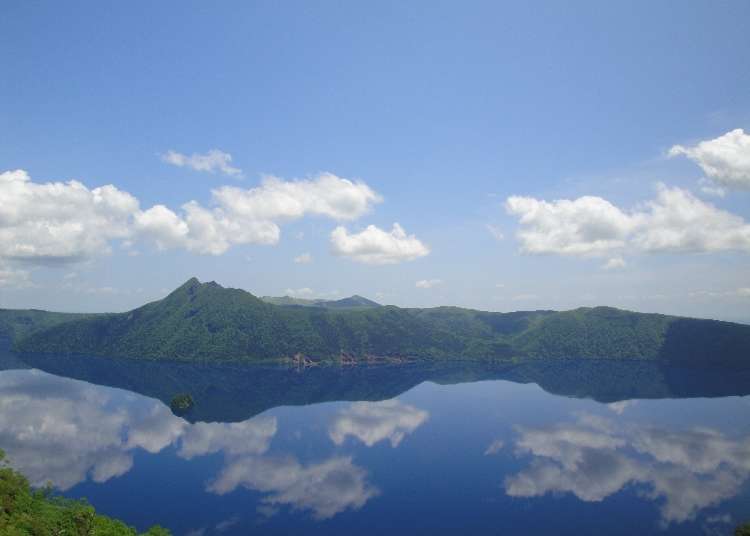
Best Things to Do At Lake Mashu - Hokkaido’s Mysterious Volcanic Lake
- Written by: Minna no Kotoba Sha
Renowned for its deep blue hue, Lake Mashu is one of Hokkaido’s finest natural sights! Known in the Ainu language as Kamuito, the ‘Lake of Gods’, this magnificent wonder is the perfect addition to any nature lover’s Hokkaido itinerary.
So what’s the secret behind Lake Mashu’s enchanting clear waters, and what can you actually do there? We’ll take you through the delights of Lake Mashu throughout the year, from the fresh greenery of summer to the depths of the intense white winters!
What Kind of Place is Lake Mashu?
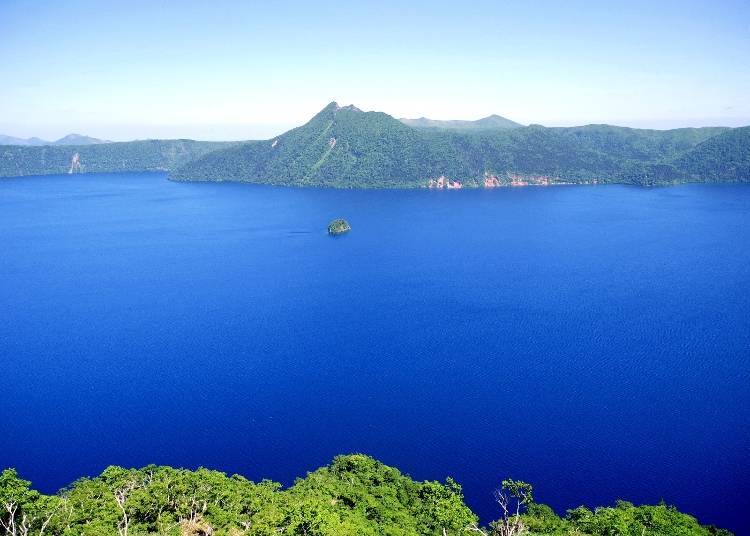
Located in the Akan Mashu National Park in eastern Hokkaido, Lake Mashu is a 19.6 square kilometer volcanic caldera lake with a whopping 20-kilometer circumference.
As the lake and surroundings are a designated ‘Special Protection Area’ enclosed by sharp cliffs, it is impossible to actually go down into the lake. However, there are lookouts offering stunning panoramas sure to satisfy!
Why are Lake Mashu's waters so clear?
With rain as its primary source, the lake is free from much of the plankton and sediment carried in by rivers. This is believed to be the central reason why Lake Mashu retains such a high transparency level.
What’s the Weather at Lake Mashu Like?
Lake Mashu is notorious for being foggy - there’s even a Japanese song called ‘Foggy Lake Mashu!’ This is particularly true during June and July, when the lake is only half-visible for much of the time.
However, even the thickest fog can suddenly lift to reveal a dazzling scene, and fans of the lake often argue that one of its charms lies in waiting patiently for a clear view. Once it does lift, the mountains and sky are perfectly reflected upon the water’s mirror-like surface.
What’s the Island Floating in the Middle?
Lake Mashu is big enough to boast its own mini-island! This island is actually the tip of a volcano, which pokes out from the lake’s surface, creating a roughly 30-meter tall island. The island is known in the Ainu language as Kamuishu (‘the old woman who became a god’), due to the legend that an old woman searching for her grandchild came to the lake’s edge and, being unable to move due to the pain and sadness, transformed into Mashu’s island.
How to Get to Lake Mashu
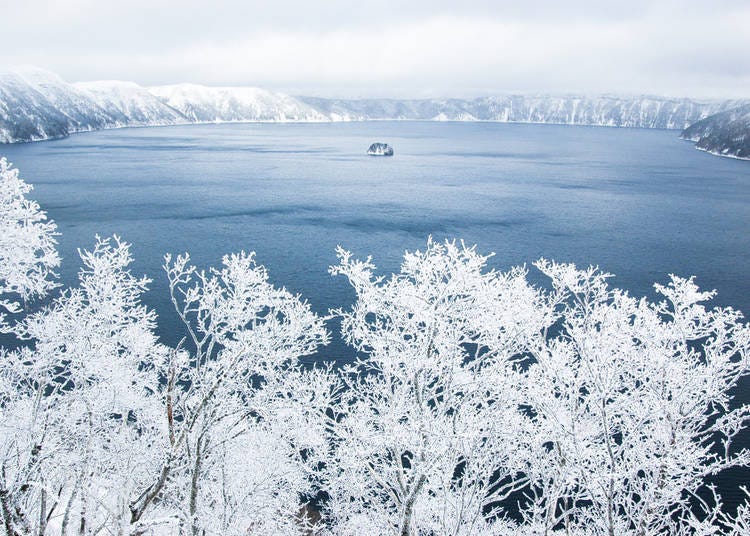
If you’re visiting by public transport, the closest airports are Memanbetsu Airport and Kushiro Airport.
From Memanbetsu Airport, take a bus to Abashiri Station and board a train on the Semmo Main Line until JR Mashu Station. If you’re arriving at Kushiro Airport, catch a bus to JR Kushiro Station, hop on a train on the Semmo Main Line and again get off at JR Mashu Station.
From JR Mashu Station, board a bus bound for ‘Mashu-ko Dai-ichi Tenboudai.’ It will arrive at the lake observatory in roughly 30 minutes. Putting it all together, the entire journey from the airport should take roughly 3 and a half hours.
If you’re coming via car, it’s around a 1 1/2 hour drive from Memanbetsu Airport or Nakashibetsu Airport. Kushiro Airport is a little longer at 2 hours.
-

-
Address
Lake Mashu, Teshikaga-cho, Kawakami-gun, Hokkaido, 088-3201
View Map -
Nearest Station
Mashu Station (Senmo Main Line)
20 minutes by car
- Phone Number 015-482-2200
-
Address
Lake Mashu, Teshikaga-cho, Kawakami-gun, Hokkaido, 088-3201
Things to Do in the Warm Months at Lake Mashu
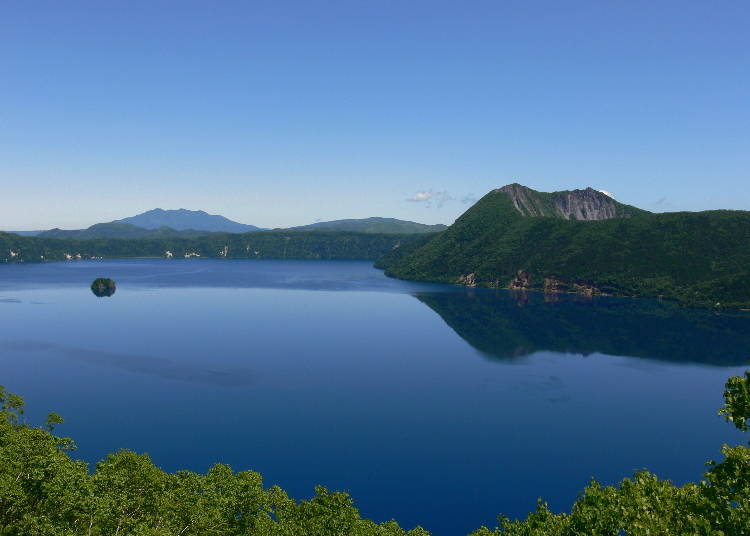
1. Get Gorgeous Views of the Lake From the Observatories
Beginning in spring, the wilderness encircling Lake Mashu slowly becomes more and more radiant before peaking in summer. To take in this lush, breathtaking scenery at its peak, head to one of the following 3 lookout platforms!
■Lake Mashu 1st Observatory
The most popular view of Lake Mashu is the 1st Observatory! Being the closest to JR Mashu station, it’s also the easiest to find. With a small shop serving light meals and souvenirs, plus a rest house, it’s easy to see why it’s such a hit.
■Lake Mashu 3rd Observatory
Being closer to the lake than #1, Lake Mashu 3rd Observatory allows a better look at Kamuishu Island. The opposite side of the lake also overlooks a horizon filled with iconic Hokkaido sights such as Mount Iwo and Lake Kussharo. While there is a free car park, be aware there are no shops or restroom facilities. The observatory is also closed during winter (November - April).
■Uramashu Observatory
While the closest observatory to the lake’s surface, the Uramashu Observatory is surrounded by thick trees, making the view a little narrow. However, its low height escapes much of the notorious fog, allowing views of the lake while the others are completely blocked out.
Somewhat of a hidden gem, visitors are much fewer here, allowing you to slowly and silently take in the sights. As it is shut for winter, the Uramashu Observatory can only be visited between April and November. There is a free car park and shop/restroom open during summer.
2. Enjoy Mountain Hiking
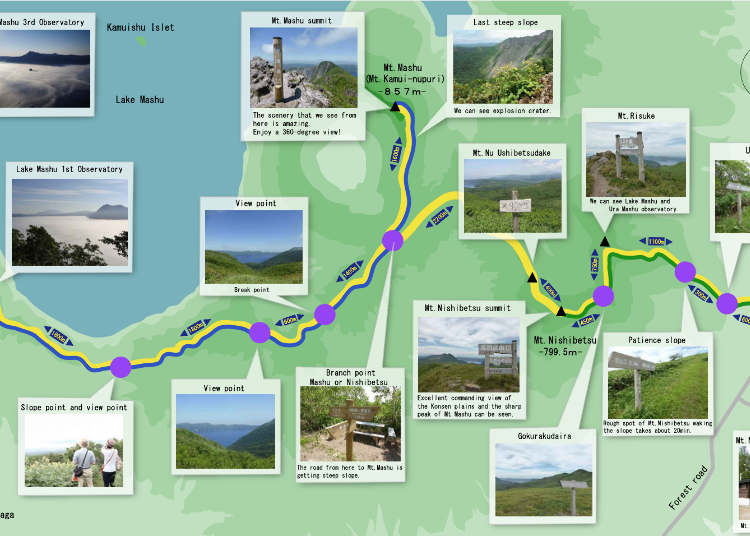
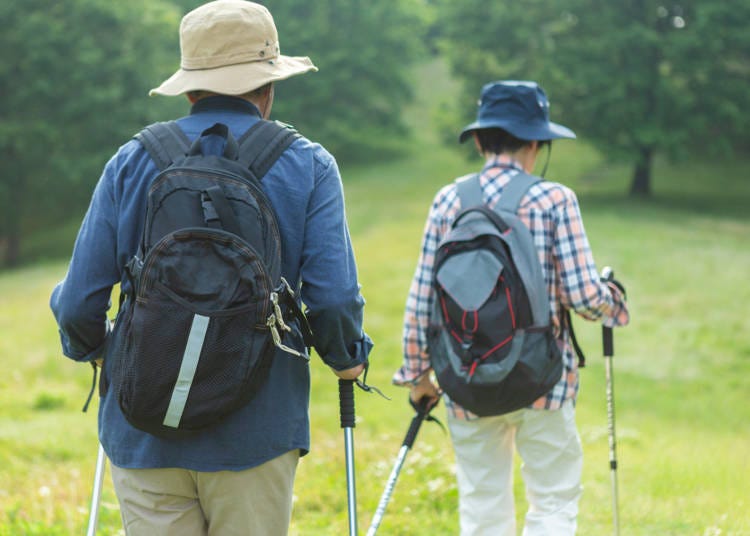
The pleasant, refreshing summer of Hokkaido is perfect for hiking! Adventurous hikers can journey to the top of Lake Mashu’s eastern Mashu-dake and Nishi-betsu-dake, which present sweeping views of the entire Mashu region in all its glory.
You can get to Mashu-dake from the Lake Mashu 1st Observatory and Nishi-betsu-dake from the ‘Nishi-betsu-dake Hiking Path Entrance.’
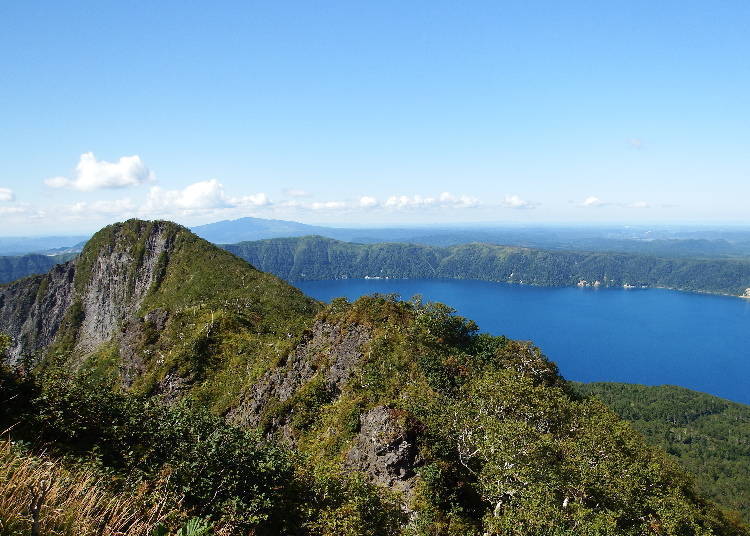
Thrill-seekers will be excited to learn that Mashu-dake is actually an 857-meter tall stratovolcano known as Kamuinupuri, ‘The Mountain of Gods’ in Ainu. While walking, hikers will be gifted incredible lake views on their left, complemented by an array of native flowers dotting the track.
While Nishi-betsu-dake is a little shorter at 800 meters tall, it more than makes up for this with a spellbinding 360° view and impressive seasonal alpine plants and flowerbeds. The path is wide and neatly constructed, making it a fun climb for hikers of all levels!
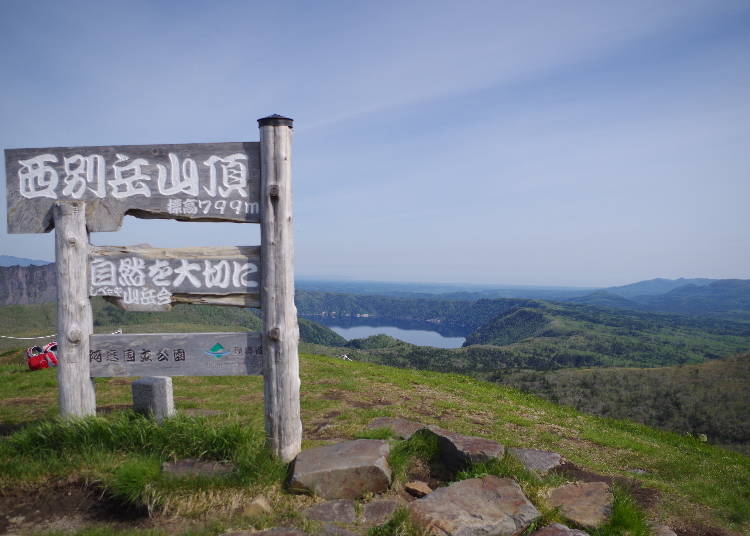
Before clumbing, we recommend stopping by the Kawayu Eco Museum Center in Kawayu Onsen. Here you can pick up an English hiking guide of the area and rent rainy weather gear and hats.
3. Enjoy a Sea of Clouds
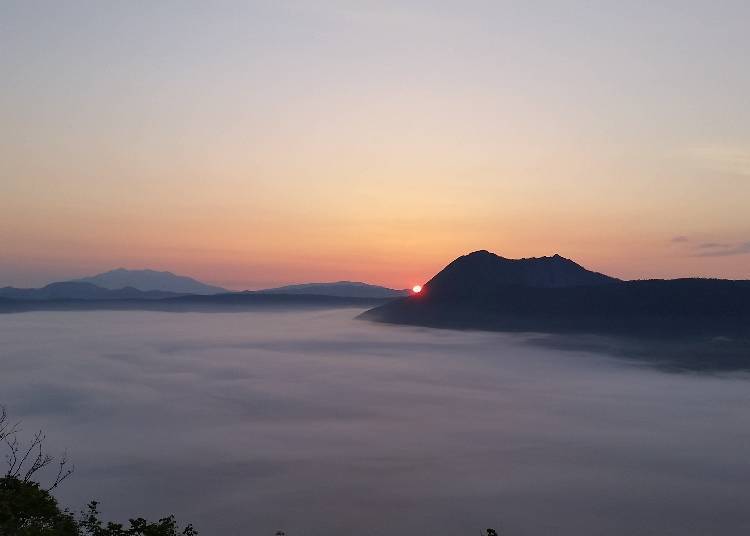
Early in the morning between June and October, the entire lake is often engulfed in an otherworldly sea of clouds, known as unkai in Japanese.
You can catch this dream-like phenomenon at the Tsubetsu Pass Observatory, which is higher than many of the others, or at Lake Mashu 3rd Observatory. If luck is on your side, you’ll witness a sea of clouds stretching from Lake Mashu to Lake Kussharo.

There are also specialized unkai sea of cloud tours held at Lake Mashu 3rd Observatory. Looking down over the endless ocean of pure white will make you feel like you’re floating in the sky!
If certain conditions are met, a waterfall-like flow of clouds will pour out from the lake crater, creating a truly unreal scene. Regardless of the season, it’ll be cold in the morning, so choose your clothes wisely!
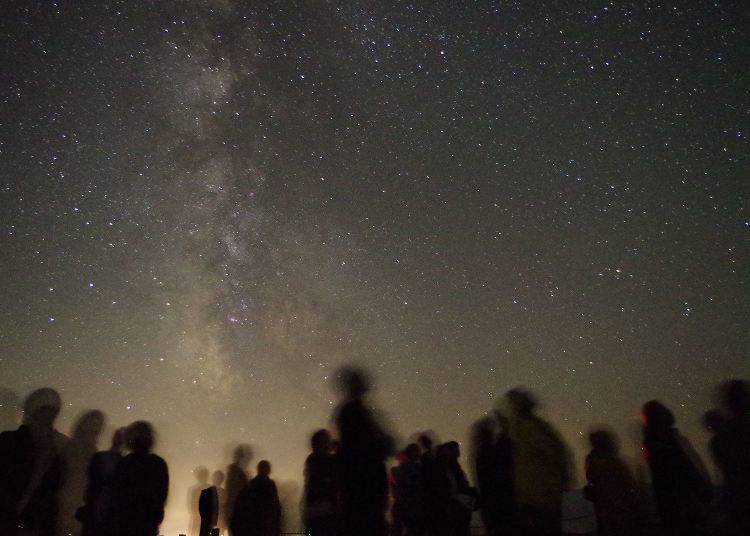
Relax While Doing Night-time Stargazing
The entire region around Lake Mashu is free of large cities, ensuring pristine air and a stunning night sky perfect for stargazing! The best time is between October and May, when clear days are plentiful.
For the ultimate experience, join a special stargazing tour at the Lake Mashu 1st Observatory. Equipped with a powerful laser pointer, you’ll be guided through the captivating secrets of the night sky, complete with fascinating space trivia sure to inspire.
If there is no wind, the beauty is doubled as thousands of stars are mirrored upon the lake’s still surface. Even in spring and summer, the nighttime is chilly, so don’t forget your jacket!
Enjoy Cycling Around the Lake
We also recommend a fun cycling ride through the beautiful wilderness surrounding Lake Mashu. After getting a map showing the cycling course, you can take in the outdoors and fully enjoy a self-guided tour around the mysterious beauty of Lake Mashu and Kaminokoike Pond.
-
Lake Mashu Observatory No.1摩周第一展望台
- Address Tesikagagenya, Kawakami-gun, Teshikaga-cho, Hokkaido, 088-3200, Japan
-
Lake Mashu Observatory No.3摩周第三展望台
- Address Tesikagagenya, Kawakami-gun, Teshikaga-cho, Hokkaido, 088-3200, Japan
-
Lake Uramashu Observatory裏摩周展望台
- Address Kiyoizumi, Shari Gun Kiyosato Cho, Hokkaido, 099-4526, Japan
- Phone Number 015-483-4100
-
Kawayu Eco Museum Center川湯エコミュージアムセンター
- Address 2-2-6, Kawayu Onsen, Kawakami-gun, Teshikaga-cho, Hokkaido, 088-3465, Japan
Opening Hours:
・April - October: 8:00am - 5:00pm
・November - March: 9:00am - 4:00pm
Closed:
・Wednesdays (if Wednesday is a public holiday, then the next regular weekday will be closed instead). (No days off between the 3rd week of July and 31 August)
・New Year’s Week (29 December - 3 January)
What to Do in Winter at Lake Mashu
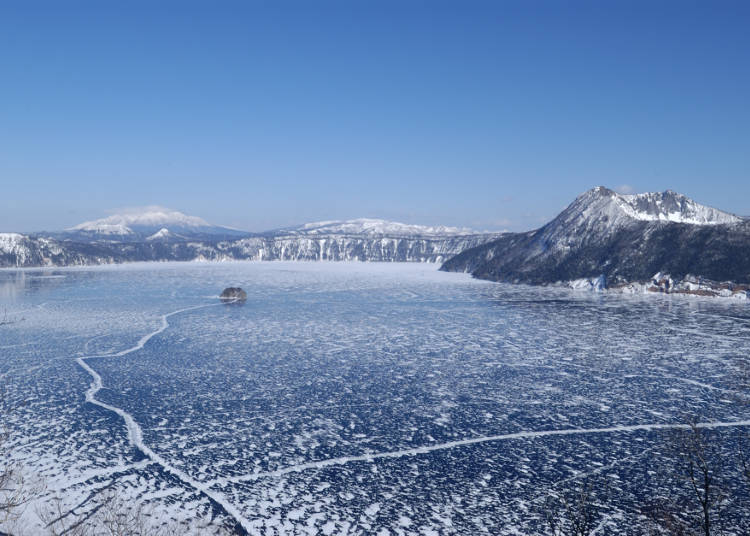
1. Take in the Extraordinary Frozen Scenery
Witnessing the jaw-dropping panorama of the pure blue lake encompassed by stark white snow makes braving the brutal winter worth it!
Adding to this is the rime ice, appearing almost like white flowers, which occurs when the supercooled mist is frozen to trees. During this time, the 3rd Observatory and the Uramashu Observatory are closed, leaving only the 1st Observatory open to visitors. If you’re coming by car, exercise extreme caution driving on the frozen roads!
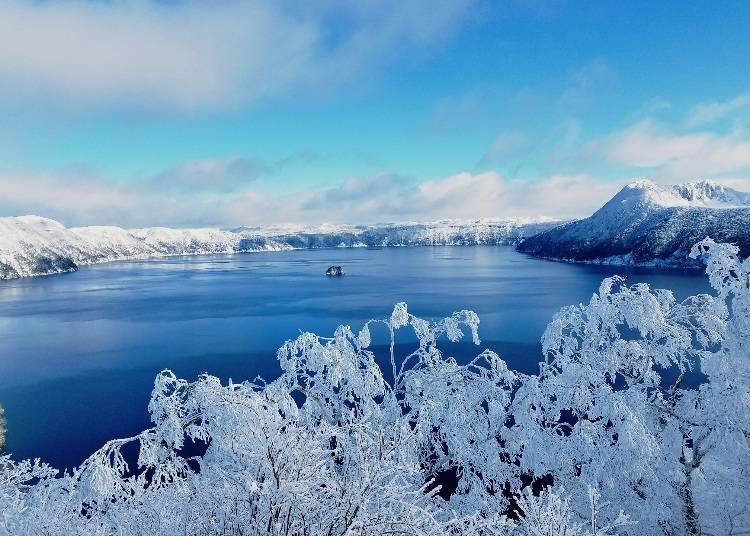
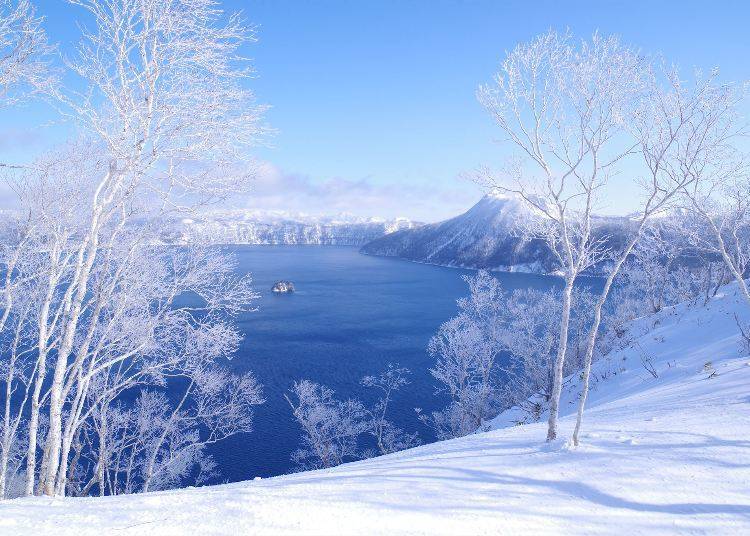
From Observatory No.1 is a specialized tour exploring the frozen wonderland. With trees completely encased in ice, untouched white powder snow, and sometimes even the exquisite ‘diamond dust,’ if you’re a fan of winter scenery, this tour is a must!
As mentioned above, while rare, diamond dust can occasionally be spotted around Lake Mashu during winter. This spellbinding phenomenon is caused by the instant freezing of water vapor, which turns into fine particles of ice that float in the breeze and glitter like diamonds. This, along with the rime ice, are the epitome of winter beauty!
During mid-winter, early mornings can drop down to as low as -20°C! So, in addition to ski wear, scarves, earmuffs, and beanies, pack everything you can possibly think of to stay warm! If you’re staying at Kawayu Onsen, drop-offs and pick-ups are available.
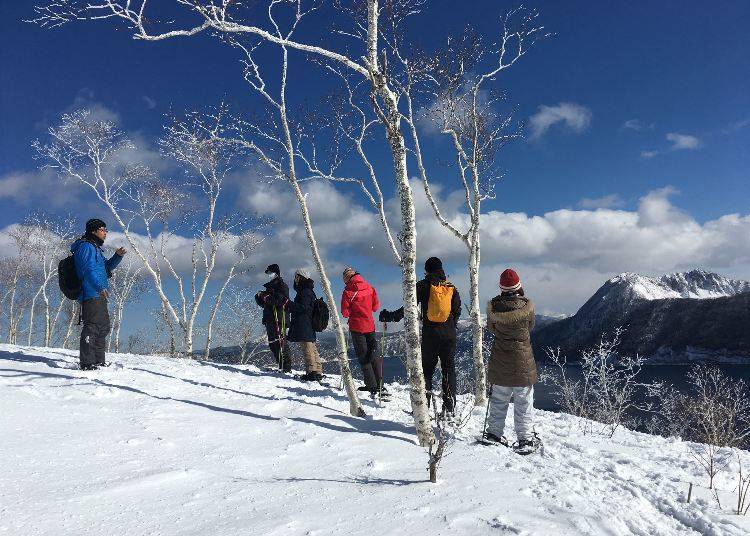
2. Hike Around Lake Mashu with Snowshoes
Explore those nooks and crannies hidden from the observatories with a winter walking tour around the rim of Lake Mashu!
If the weather permits, the neighboring Lake Kussharo, along with the distant mountains around Akan and the Shiretoko Peninsula, can easily be spotted. You’ll be out in the cold for an hour and a half, so don’t leave any exposed skin and wear your ski clothes!
All tours currently exercise the following COVID-19 countermeasures:
All guides and participants must wear masks and disinfect hands. Social distancing must be maintained inside the pick-up/drop-off car. The car will be ventilated and regularly disinfected. All gear used will be regularly disinfected.
-
National Park Tourism Teshikaga株式会社ナショナルパークツーリズムてしかが
- Address 1-2-30, Kawayuonsen, Kawakami-gun, Teshikaga-cho, Hokkaido, 088-3465, Japan
- Phone Number 015-483-2101
Hot or cold, Lake Mashu is worth visiting all year round! Overflowing with unspoiled beauty, it remains one of Hokkaido’s most impressive natural wonders. Whether you prefer being entranced from the comfort of an observatory or getting out there and exploring the wilderness on a hike, there are so many ways to enjoy Lake Mashu!
Text by: Minna no Kotobasha
* The information in this article is as of December 2020.
Minna no Kotoba Sha is a production company founded by an editor with extensive experience in editing local magazines in Sapporo. For over 20 years, our team has conducted research and written articles across Hokkaido, with Sapporo as our primary hub. Our diverse portfolio includes the production of various books such as travel guides, informational magazines, and collections showcasing the picturesque landscapes of Hokkaido. Comprised entirely of women, the team at Minna no Kotoba Sha boasts diverse interests, including a passion for travel, culinary delights, and alcoholic beverages. The scope of our communication efforts spans a wide range, covering everything from introducing notable restaurants to providing coverage of local events and sharing stories of leisure experiences.
- Area
- Category
*Prices and options mentioned are subject to change.
*Unless stated otherwise, all prices include tax.
Popular Tours & Activitiess
Recommended places for you
-
Appealing

Shiroi Koibito Park
Theme Parks
Sapporo / Chitose
-
Appealing

Asahiyama Zoo
Zoos, Aquariums & Botanical Gardens
Asahikawa
-
Appealing

Rukku and Uohei
Izakaya
Sapporo / Chitose
-
Appealing

Mt. Hakodate Observatory
Forests & Mountains
Hakodate
-

Former Hokkaido Government Office Building (Red Brick Office)
Other Historic Sites
Sapporo / Chitose
-

LakeAkan
Rivers, Lakes & Canyons
Abashiri
-
Ad

Smart Ways to Avoid Crowds and Enjoy a Safe, Comfortable Trip to Noboribetsu Onsen
-
Ad

Explore Eastern Hokkaido from Tancho Kushiro Airport: Your Gateway to Grand Nature
-

Jozankei Onsen: 10 Luxurious Hotels with Private Hot Springs & Stunning Views Near Sapporo
by: Robotan
-
Ad

Welcome to Sapporo! Here’s How to Expore the Ciy Like a Local
-

Explore Japan in 7 Days: The Ultimate Local Rail Adventure with the Hokkaido & East Japan Pass
by: Guest Contributor
-
Ad

Sapporo SATUDORA Shopping Guide: Get Souvenirs, Medicine & More at This Iconic Drugstore (Special Deal Inside!)
-

Top 5 Things to Do Around Lake Toya: Hokkaido's Land of Inspiring Views and Delectable Sweets!
-

10 Fun Activities and Magical Places in Furano - According to a Singaporean Expat
-

Kichijoji – Explore Tokyo’s Top-Rated Stylish Suburb in Half a Day!
-

Hokkaido's Dreamy Blue Pond: Here's When to Visit Aoike for That Unreal Glow (Photo Tips + More)
-

Noboribetsu Jigokudani: Guide & Best Things to Do in Hokkaido's Mysterious 'Hell Valley'!
-

Noboribetsu Onsen: 5 Best Things to Do in Japan's Famous Hot Springs Town!
- #best sushi hokkaido
- #things to do hokkaido
- #best ramen sapporo
- #what to bring to japan
- #new years in tokyo
- #what to buy in ameyoko
- #japanese nail trends
- #what to do in odaiba
- #onsen tattoo friendly tokyo
- #daiso
- #best sweets otaru
- #japanese fashion culture
- #best nature furano
- #japanese convenience store snacks
- #best japanese soft drinks














